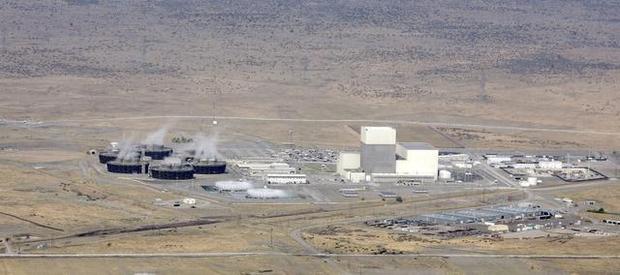forum
library
tutorial
contact

Conservation Groups Sue State Agency Over
Columbia Generating Station Discharge Permit
by Drew Foster
Tri-City Herald, October 30, 2014
|
the film forum library tutorial contact |

|
Conservation Groups Sue State Agency Over
by Drew Foster
|
 A lawsuit filed Thursday in Thurston County by three conservation groups alleges the Columbia Generating Station is discharging potentially harmful water into the Columbia River.
A lawsuit filed Thursday in Thurston County by three conservation groups alleges the Columbia Generating Station is discharging potentially harmful water into the Columbia River.
The lawsuit was filed against the Washington Energy Facility Site Evaluation Council and challenges the pollution discharge permit, which allows the nuclear plant to discharge "water pollution at levels that violate state standards designed to protect public health, fish and other aquatic species," according to a statement.
Energy Northwest vigorously disagreed. Spokesman Mike Paoli called the lawsuit "hogwash."
"That's absolutely not true," Paoli said. He added, "What we put in (the river) meets all regulatory standards under the Clean Water Act."
Officials with the Energy Facility Site Evaluation Council said they could not comment on an ongoing lawsuit.
The lawsuit was filed by the Northwest Environmental Defense Center, Northwest Environmental Advocates and Columbia Riverkeeper, which want to see the pollution discharge permit revoked and re-evaluated.
Energy Northwest was awarded a new pollution discharge permit Sept. 30. The permit goes into effect Saturday. The conservation groups had a 30-day window after the Sept. 30 issuance to challenge the permit in court. The lawsuit does not seek to close the nuclear plant.
The groups are asking the court to overturn a state decision to ignore expert advice from federal government scientists on potentially lethal impacts to salmon in the Columbia River near the nuclear plant.
Salmon are adversely affected by the water being discharged from the Columbia Generating Station and by the intake structures that bring water to the plant, the lawsuit said.
"This nuclear reactor is one of many sources of toxic chemicals that are contaminating the fish and wildlife of the Columbia River, including heavy metals from Hanford operations," said Nina Bell, executive director of Northwest Environmental Advocates.
Paoli compared the quality of the plant's discharged water to that of the steam rising from a cooling tower, saying the water carries just as many pollutants - "none," he said.
"There's no science to back up that we have any impact on salmon," Paoli said.
Paoli pointed to a fact sheet from the Energy Facility Site Evaluation Council detailing Energy Northwest's work for a new pollution discharge permit. The nuclear plant complied with all limits on temperature, flow, total residual halogen, pH, copper, polychlorinated biphenyl compounds and 126 priority pollutants contained in chemicals added for cooling tower maintenance.
The nuclear plant relies on a closed-loop cooling system where cold river water is cycled multiple times before being discharged. The system requires lower water withdrawals from the river than a once-use system where water is drawn, cycled and discharged. The closed-loop cooling system is considered by the Environmental Protection Agency to be "the best available technology for intake structures," Paoli said.
Water drawn from the river is treated with additives to purify the water and reduce corrosion, Paoli said. After cycling through the plant, the water is kept in a holding area so additives dissipate before the water is released.
Energy Northwest also performs monthly discharge monitoring reports on the quality of the water put back into the river, said John Dobken, another Energy Northwest spokesman.
The conservation groups also allege that salmon are prone to injury from the screens used at the nuclear plant's water intake structures. Marla Nelson, a staff attorney with the Northwest Environmental Defense Center, said fish get stuck on the screens and are sometimes even sucked through the larger holes.
Again, Paoli disagreed. "We do not have salmon swimming in the Columbia Generating Station," he said.
The fact sheet states "no adverse environmental impact has been demonstrated" by the intake structures and the structures were built to minimize fish impacts, including locating the structures well offshore "where the number of downstream salmonid fry are expected to be relatively small."
Nelson couldn't estimate when the lawsuit might be resolved.
"We don't see this being a super quick turnaround," she said.
Related Pages:
Energy Northwest Defends Its Columbia River Track Record by Nuclear Street, Nuclear Street, 11/4/14
Groups File Suit Challenging Water Quality Permit for Northwest's Only Nuclear Plant by Staff, Columbia Basin Bulletin, 10/31/14
Energy Northwest Defends Water Permit for its Richland Nuclear Plant by Wendy Culverwell, Portland Business Journal, 11/3/14
Environmental Groups Sue Washington Over Nuclear Plant's Effect on Columbia River by Nicholas K. Geranios, The Oregonian, 10/30/14
learn more on topics covered in the film
see the video
read the script
learn the songs
discussion forum
